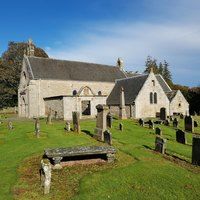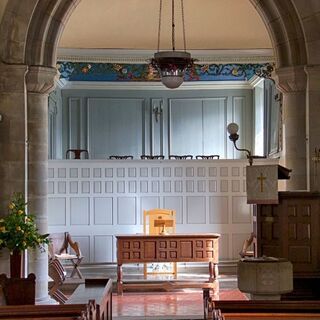We found 100 more Church of Scotland churches near South Queensferry
 Newhaven Church of Scotland, Edinburgh (10.75 miles)
Newhaven Church of Scotland, Edinburgh (10.75 miles) Kirk of Calder, Mid Calder (7.33 miles)
Kirk of Calder, Mid Calder (7.33 miles) Polbeth Harwood Parish Church, West Calder (9.88 miles)
Polbeth Harwood Parish Church, West Calder (9.88 miles)
 Burntisland, Burntisland (10.27 miles)
Burntisland, Burntisland (10.27 miles) Dean Parish Church, Edinburgh (10.18 miles)
Dean Parish Church, Edinburgh (10.18 miles) Craiglockhart Parish Church, Craiglockhart Drive North (10.33 miles)
Craiglockhart Parish Church, Craiglockhart Drive North (10.33 miles) St Stephen's Comely Bank Church, Edinburgh (10.2 miles)
St Stephen's Comely Bank Church, Edinburgh (10.2 miles) Corstorphine Old Parish Church, Edinburgh (8.35 miles)
Corstorphine Old Parish Church, Edinburgh (8.35 miles) Aberdour St Fillans, Aberdour (7.98 miles)
Aberdour St Fillans, Aberdour (7.98 miles) St Nicholas Church, Edinburgh (8.77 miles)
St Nicholas Church, Edinburgh (8.77 miles) Murrayfield Parish Church, Edinburgh (9.67 miles)
Murrayfield Parish Church, Edinburgh (9.67 miles) Kelty, Kelty (10.13 miles)
Kelty, Kelty (10.13 miles) Grangemouth Zetland, Grangemouth (9.51 miles)
Grangemouth Zetland, Grangemouth (9.51 miles) Davidson's Mains Parish Church, Edinburgh (8.13 miles)
Davidson's Mains Parish Church, Edinburgh (8.13 miles) Dunfermline Gillespie Memorial, Dunfermline (5.3 miles)
Dunfermline Gillespie Memorial, Dunfermline (5.3 miles) Saline & Blairingone, Dunfermline (9.04 miles)
Saline & Blairingone, Dunfermline (9.04 miles) Grangemouth Kirk of the Holy Rood, Grangemouth (9.4 miles)
Grangemouth Kirk of the Holy Rood, Grangemouth (9.4 miles) Balerno Parish Church, Balerno (9.29 miles)
Balerno Parish Church, Balerno (9.29 miles) Holy Trinity Church, Edinburgh (9.31 miles)
Holy Trinity Church, Edinburgh (9.31 miles) Gorgie Dalry Parish Church, Edinburgh (10.43 miles)
Gorgie Dalry Parish Church, Edinburgh (10.43 miles) St Ninian's Craigmailen Parish Church, Linlithgow (5.56 miles)
St Ninian's Craigmailen Parish Church, Linlithgow (5.56 miles) Dunfermline St Andrew's Erskine, Dunfermline (6.15 miles)
Dunfermline St Andrew's Erskine, Dunfermline (6.15 miles) Edinburgh Polwarth, Edinburgh (10.6 miles)
Edinburgh Polwarth, Edinburgh (10.6 miles) Gorgie Dalry Parish Church, Edinburgh (10.17 miles)
Gorgie Dalry Parish Church, Edinburgh (10.17 miles) Strathbrock Parish Church, Broxburn (4.48 miles)
Strathbrock Parish Church, Broxburn (4.48 miles) North Queensferry, Inverkeithing (3.3 miles)
North Queensferry, Inverkeithing (3.3 miles) Carnock and Oakley, Dunfermline (7.04 miles)
Carnock and Oakley, Dunfermline (7.04 miles) Carnock and Oakley, Dunfermline (6.62 miles)
Carnock and Oakley, Dunfermline (6.62 miles) Dunfermline Abbey, Dunfermline (5.12 miles)
Dunfermline Abbey, Dunfermline (5.12 miles) Slateford Longstone Church, Edinburgh (9.65 miles)
Slateford Longstone Church, Edinburgh (9.65 miles) St Andrew's Clermiston Church, Edinburgh (7.9 miles)
St Andrew's Clermiston Church, Edinburgh (7.9 miles) Colinton Parish Church, Edinburgh (10.37 miles)
Colinton Parish Church, Edinburgh (10.37 miles) St Davids Broomhouse Church, Edinburgh (8.94 miles)
St Davids Broomhouse Church, Edinburgh (8.94 miles) Currie Kirk, Edinburgh (9.49 miles)
Currie Kirk, Edinburgh (9.49 miles) St Anne's Parish Church, Edinburgh (8.61 miles)
St Anne's Parish Church, Edinburgh (8.61 miles) Bathgate High Parish Church, Bathgate (9.03 miles)
Bathgate High Parish Church, Bathgate (9.03 miles) Dunfermline St Ninian's, Dunfermline (5.16 miles)
Dunfermline St Ninian's, Dunfermline (5.16 miles) Limekilns, Dunfermline (2.65 miles)
Limekilns, Dunfermline (2.65 miles) Granton Parish Church, Edinburgh (9.76 miles)
Granton Parish Church, Edinburgh (9.76 miles) Dalgety, Dunfermline (5.35 miles)
Dalgety, Dunfermline (5.35 miles) Carriden, Bo'ness (4.1 miles)
Carriden, Bo'ness (4.1 miles) Bo'ness Old, Bo'ness (5.6 miles)
Bo'ness Old, Bo'ness (5.6 miles) Boghall Parish Church, Bathgate (8.43 miles)
Boghall Parish Church, Bathgate (8.43 miles) Falkirk Laurieston, Laurieston (10.42 miles)
Falkirk Laurieston, Laurieston (10.42 miles) Kingscavil Church, Linlithgow (3.59 miles)
Kingscavil Church, Linlithgow (3.59 miles) Dalmeny, South Queensferry (4.03 miles)
Dalmeny, South Queensferry (4.03 miles) Culross & Torryburn, Dunfermline (6.56 miles)
Culross & Torryburn, Dunfermline (6.56 miles) Dunfermline Townhill and Kingseat, Dunfermline (6.56 miles)
Dunfermline Townhill and Kingseat, Dunfermline (6.56 miles) Culross & Torryburn, Culross (7.26 miles)
Culross & Torryburn, Culross (7.26 miles) Bo'ness St Andrew's, Bo'ness (4.84 miles)
Bo'ness St Andrew's, Bo'ness (4.84 miles) Livingston Old Parish Church, Livingston Village (8.07 miles)
Livingston Old Parish Church, Livingston Village (8.07 miles) Torphichen Kirk, Bathgate (8.09 miles)
Torphichen Kirk, Bathgate (8.09 miles) St Michaels Parish Church, Edinburgh (10.39 miles)
St Michaels Parish Church, Edinburgh (10.39 miles) Carriden, Linlithgow (1.9 miles)
Carriden, Linlithgow (1.9 miles) St Serf's Parish Church, Edinburgh (10.54 miles)
St Serf's Parish Church, Edinburgh (10.54 miles) Ratho Parish Church, Ratho (6.13 miles)
Ratho Parish Church, Ratho (6.13 miles) Craigsbank Church, Edinburgh (7.75 miles)
Craigsbank Church, Edinburgh (7.75 miles) Cowdenbeath Trinity Church, Cowdenbeath (8.72 miles)
Cowdenbeath Trinity Church, Cowdenbeath (8.72 miles) Polmont Old, Polmont (8.96 miles)
Polmont Old, Polmont (8.96 miles) Uphall South Parish Church, Broxburn (4.7 miles)
Uphall South Parish Church, Broxburn (4.7 miles) Cramond Kirk, Edinburgh (6.88 miles)
Cramond Kirk, Edinburgh (6.88 miles) Stockbridge Church, Edinburgh (10.63 miles)
Stockbridge Church, Edinburgh (10.63 miles) Edinburgh Corstorphine St Ninian's, Edinburgh (8.17 miles)
Edinburgh Corstorphine St Ninian's, Edinburgh (8.17 miles) Auchtertool, Kirkcaldy (10.42 miles)
Auchtertool, Kirkcaldy (10.42 miles) Balerno Parish Church, Balerno (9.29 miles)
Balerno Parish Church, Balerno (9.29 miles) St Michael's Parish Church, Linlithgow (5.04 miles)
St Michael's Parish Church, Linlithgow (5.04 miles) Brightons, Brightons (9.51 miles)
Brightons, Brightons (9.51 miles) Edinburgh Blackhall St Columba, Edinburgh (8.98 miles)
Edinburgh Blackhall St Columba, Edinburgh (8.98 miles) Dunfermline St Leonard's, Dunfermline (4.94 miles)
Dunfermline St Leonard's, Dunfermline (4.94 miles) East Calder Parish Church, East Calder (6.98 miles)
East Calder Parish Church, East Calder (6.98 miles) Dunfermline St Margaret's, Dunfermline (5.76 miles)
Dunfermline St Margaret's, Dunfermline (5.76 miles) Cairneyhill, Dunfermline (4.89 miles)
Cairneyhill, Dunfermline (4.89 miles) Saint John's Parish Church, Bathgate (9.13 miles)
Saint John's Parish Church, Bathgate (9.13 miles) Edinburgh Palmerston Place, Edinburgh (10.53 miles)
Edinburgh Palmerston Place, Edinburgh (10.53 miles) Dunfermline North Parish, Dunfermline (5.48 miles)
Dunfermline North Parish, Dunfermline (5.48 miles) Queensferry Parish Church, South Queensferry (3.03 miles)
Queensferry Parish Church, South Queensferry (3.03 miles) Livingston Old Parish Church, Livingston (8.07 miles)
Livingston Old Parish Church, Livingston (8.07 miles) Muiravonside, Linlithgow (7.89 miles)
Muiravonside, Linlithgow (7.89 miles) Corstorphine Old Parish Church, Edinburgh (8.35 miles)
Corstorphine Old Parish Church, Edinburgh (8.35 miles) Redding and Westquarter, Redding (9.96 miles)
Redding and Westquarter, Redding (9.96 miles) Winchburgh Church, Winchburgh (2.54 miles)
Winchburgh Church, Winchburgh (2.54 miles) Inverkeithing Parish, Inverkeithing (3.87 miles)
Inverkeithing Parish, Inverkeithing (3.87 miles) Broxburn Parish Church, Broxburn (4.26 miles)
Broxburn Parish Church, Broxburn (4.26 miles) Juniper Green Parish Church, Edinburgh (9.76 miles)
Juniper Green Parish Church, Edinburgh (9.76 miles) Blackburn & Seafield Church, Blackburn (10.14 miles)
Blackburn & Seafield Church, Blackburn (10.14 miles) Kirknewton Parish Church, Kirknewton (7.63 miles)
Kirknewton Parish Church, Kirknewton (7.63 miles) Cowdenbeath Trinity, Cowdenbeath (7.36 miles)
Cowdenbeath Trinity, Cowdenbeath (7.36 miles) Tulliallan and Kincardine, Alloa (10.71 miles)
Tulliallan and Kincardine, Alloa (10.71 miles) Culross & Torryburn, Dunfermline (5.54 miles)
Culross & Torryburn, Dunfermline (5.54 miles) Grangemouth Abbotsgrange, Grangemouth (9.59 miles)
Grangemouth Abbotsgrange, Grangemouth (9.59 miles) Livingston United Parish Church, Livingston (6.79 miles)
Livingston United Parish Church, Livingston (6.79 miles) Stenhouse Saint Aidan's Parish Church, Edinburgh (9.68 miles)
Stenhouse Saint Aidan's Parish Church, Edinburgh (9.68 miles) Kirkliston Parish Church, Kirkliston (3.98 miles)
Kirkliston Parish Church, Kirkliston (3.98 miles) Drylaw Parish Church, Edinburgh (8.95 miles)
Drylaw Parish Church, Edinburgh (8.95 miles) Rosyth, Dunfermline (3.61 miles)
Rosyth, Dunfermline (3.61 miles) Carrick Knowe Parish Church, Edinburgh (8.68 miles)
Carrick Knowe Parish Church, Edinburgh (8.68 miles) Carriden, Bo'ness (4.69 miles)
Carriden, Bo'ness (4.69 miles) Dunfermline Townhill and Kingseat, Dunfermline (7.54 miles)
Dunfermline Townhill and Kingseat, Dunfermline (7.54 miles) Edinburgh the Old Kirk and Muirhouse, Edinburgh (8.83 miles)
Edinburgh the Old Kirk and Muirhouse, Edinburgh (8.83 miles) Wardie Parish Church, Edinburgh (10.25 miles)
Wardie Parish Church, Edinburgh (10.25 miles)
Who we are
Abercorn Church is next to the hamlet of Abercorn, on a site where Christ has been worshipped for 1500 years: tradition holds that St Ninian visited the site. The small museum contains burial stones and cross shafts from the early centuries of worship here. A blocked doorway on the south side of the church dates back to the 1100's. The church's current form dates back to 1893, when the church was refurbished in a way which maintained a sense of continuity with past worshippers. The church has a north aisle flanking the nave, and is traditionally laid out with pews.
We worship here each Sunday at 10.00 am.
We worship here each Sunday at 10.00 am.
Church Address

Abercorn
South Queensferry,
West Lothian
EH30 9SL
United Kingdom
Phone: 01506 890930
Download Abercorn Church vCard with Service Times
Click here to contact the church
Church Pastor

Rev Derek Henderson
Locum Minister
Abercorn
South Queensferry,
West Lothian
EH30 9SL
United Kingdom
Phone: 01506 844787 / 07968491441
Download Locum Minister Rev Derek Henderson vCard
Click here to contact Rev Derek Henderson
Denomination
Church of Scotland
Church of Scotland churches in South Queensferry, West Lothian
Church of Scotland churches in West Lothian
Church of Scotland churches in United Kingdom
Church of Scotland churches near me
All churches in South Queensferry, West Lothian

Affiliations
Church Website
Abercorn Church on Social Media
Leadership
Leader Name:
Rev Derek Henderson
Leader Position:
Locum Minister
Formal Title:
Leader Address:
Phone:
Fax:
Leader Email:
Click here to contact Rev Derek Henderson
Leader Bio:
Rev Derek Henderson on Social Media:
Other Church Leaders:
Leadership Photos
Add a Photo
Administration
Admin Name:
Marion Murdoch
Admin Position:
Treasurer
Admin Address:
Phone:
Fax:
Admin Email:
Click here to contact Marion Murdoch
Mailing Address
Driving Directions
Travel/Direction Tips
Know how to get there? Share the knowledge with others!
Parking
Please share parking information and/or parking experience!
Abercorn Church Service Times
The church is open for worship under the current Covid guidelines.
Sunday services are normally at 10.00 am: Numbers are restricted and you must wear a face covering.
Please let us know if you intend to come to worship by sending a text to Alan Carruthers on 07923 455100.
It's been more than 2 years since the last service times update. Please make sure to contact the church to confirm service times.
Please contact the church to confirm Service Times or SUBSCRIBE to updates below
Sunday services are normally at 10.00 am: Numbers are restricted and you must wear a face covering.
Please let us know if you intend to come to worship by sending a text to Alan Carruthers on 07923 455100.
It's been more than 2 years since the last service times update. Please make sure to contact the church to confirm service times.
Please contact the church to confirm Service Times or SUBSCRIBE to updates below
Worship Languages
Dress Code
Sunday School / Children and Youth Activities
Under 12s:
Under 18s:
Local outreach & community activities
Other activities & ministries
Special Needs/Accessibility
Prayers and Hymns
Main Bible:
Hymns and Songs:
Other information
Average Adult Congregation:
Average Youth Congregation:
Additional Info:
Abercorn Church South Queensferry Photos
Abercorn Church History
PKW History
The first, pre-Reformation, church built in the three communities that form our present parish was at Auldcathie, about half a mile north west of Winchburgh. The earliest record we have dates from 1198 when the Prior of St Andrews in Fife, an important centre of the mediaeval church in Scotland, granted the chapel to one William Gifford.
Our Parish had a further link with St Andrews, through Patrick Hamilton of Kingscavil, one of the first martyrs of the Reformation, who was burnt at the stake there in 1528. After the Reformation there were difficulties in finding a minister for Auldcathie. To keep things going, “Exhorters” were sent out from the Parish of Abercorn and Cramond, but in 1618 the position was regularised by the Commissioners of Parliament who united the Parishes of Dalmeny and Auldcathie. As the poorest part of an exceptionally poor parish, it was not surprising that the Church at Auldcathie fell into disrepair and ruin.
In 1864 West Lothian was transformed by the first ‘oil boom’ and Paraffin Young’s first shale-oil works at Bathgate expanded with another 38 plants that year and another 80 the next. Hamlets of a few cottages grew rapidly into villages and towns. Our Parish was no exception. Railway and construction workers, miners and workers in shale oil production came to live among the farmers and farm labourers. The spiritual needs of the parish’s growing population soon outgrew the part-time ministry from St Michael’s Church in Linlithgow for the west side of the parish, and from Kirkliston Parish Church for the east side.
The first new Church to be built in our Parish was at Philipstoun, where the Earl of Hopetoun granted the site to the United Presbyterian Congregation of Western Pardovan and Philipstoun in April 1888. In Winchburgh a “mission church” was built in 1891, under the care George Fullerton, who had been assisting the Kirkliston Minister by looking after Westerton, Winchburgh and Niddry. The following year Mr. Fullerton was ordained as minister of what was now officially a Chapel of Ease, and the Earl of Hopetoun gave the site of the present building. Among its trustees was Robert Braes, Farmer at Niddry, father of one of our present elders, William, and his brother Robert who served faithfully for many years as an elder until his death..
In 1904 boundaries were revised and Winchburgh became an independent Parish, including the lands of Auldcathie. Among its first Elders, who had previously served in Kirkliston Church, was one Andrew Newton, who became Session Clerk and Sunday School Superintendent. The combined service of Mr Newton Snr and his son, also called Andrew, who later held the same offices, spanned the 20th century.
Meantime in Kingscavil, the village there too was growing, and the iron church serving as the Chapel of Ease for St.Michael’s Linlithgow became inadequate for the needs of the Community. Matters came to a crisis when it was wrecked by a storm in 1900. The present building was erected with all due deliberate haste on a site gifted by Captain Johnston Stewart of Champfleurie, and dedicated in May 1902 with the Reverend Thomas Lugton as its first Minister. After a hopeful start, a bitter blow was dealt to the community of Kingscavil when the impossibility of extending its sewerage meant re-location to the village of Bridgend, some three miles away. The Congregation, however, remained faithful to the Church at Kingscavil, despite its isolation and years of Sunday Worship at the early hour of 9.00am. In Bridgend itself a Mission Hall was built and looked after by the Minister of Pardovan.
The 20th century saw great changes and upheaval in our Parish and indeed the whole of Scotland, with two great terrible wars, the rise and fall of the shale industry, the introduction and passing of new light industries, vast changes in agriculture and the growth in commuting for work to Edinburgh and Glasgow. All this affected the churches. Already in 1946 change came when Winchburgh united with the former United Free Church of Abercorn South and Winchburgh, which stood at Woodend. That church has been demolished but its bell was gifted to the church at Abakalinka in eastern Nigeria, and transported there through the kindness of the Parish of Cramond, which paid the costs.
The 1950s was a decade of hope with post war reconstruction and the parish busy with active organisations such as Boys Brigade and the Girls’ Club. The church hall was hive of activity, and the scene of amateur pantomimes and plays fondly remembered for decades after. But things were changing fast all over Britain, and the pace of change in the parish quickened with the end of the shale oil industry in 1963.
A declining population, a declining membership and consequent financial pressures led inevitably to changes for the parish. In 1965 the Parish of Pardovan and Kingscavil, now united, were linked with Winchburgh. This meant that they continued to run their own affairs, each with a Kirk Session and Congregational Board, but shared the services of one Minister. In 1997 the two linked Parishes were united under one minister, as before, but administered by one Kirk Session and one Congregational Board, and known as the Parish of Pardovan, Kingscavil and Winchburgh, or “PKW” for short. Uniting the parishes meant the painful decision to give up the Church building in Philipstoun, Pardovan Church, which was sold and is now a private residence. The proceeds of the sale, however, enabled renovations at the two remaining churches in Kingscavil and Winchburgh to be carried out, and the replacement of the original Mission Hall in Bridgend with a modern and well-appointed building on the foundations of the old one. The New Mission Hall has become a focus for new church led activities and outreach in Bridgend.
As a result of re-adjustments between the Presbyteries of Edinburgh and of West Lothian, the Parish of Abercorn was linked to PKW on All Saints Day 2000, and has as its present Minister the Rev. Scott Marshall, whose manse is in Winchburgh. So the 21st Century saw the renewal of an old relationship, recalling the support given to the church at Auldcathie by the church at Abercorn in the 16th century, and the start of a close and fruitful relationship between the parishes.
The parish continues to develop under Scott’s ministry, having become both an Eco Congregation and a Fairtrade Church, and has recently undertaken a major refurbishment of the interior of Winchburgh Church to fit it for the needs of ministry to a changing parish.
The first, pre-Reformation, church built in the three communities that form our present parish was at Auldcathie, about half a mile north west of Winchburgh. The earliest record we have dates from 1198 when the Prior of St Andrews in Fife, an important centre of the mediaeval church in Scotland, granted the chapel to one William Gifford.
Our Parish had a further link with St Andrews, through Patrick Hamilton of Kingscavil, one of the first martyrs of the Reformation, who was burnt at the stake there in 1528. After the Reformation there were difficulties in finding a minister for Auldcathie. To keep things going, “Exhorters” were sent out from the Parish of Abercorn and Cramond, but in 1618 the position was regularised by the Commissioners of Parliament who united the Parishes of Dalmeny and Auldcathie. As the poorest part of an exceptionally poor parish, it was not surprising that the Church at Auldcathie fell into disrepair and ruin.
In 1864 West Lothian was transformed by the first ‘oil boom’ and Paraffin Young’s first shale-oil works at Bathgate expanded with another 38 plants that year and another 80 the next. Hamlets of a few cottages grew rapidly into villages and towns. Our Parish was no exception. Railway and construction workers, miners and workers in shale oil production came to live among the farmers and farm labourers. The spiritual needs of the parish’s growing population soon outgrew the part-time ministry from St Michael’s Church in Linlithgow for the west side of the parish, and from Kirkliston Parish Church for the east side.
In 1904 boundaries were revised and Winchburgh became an independent Parish, including the lands of Auldcathie. Among its first Elders, who had previously served in Kirkliston Church, was one Andrew Newton, who became Session Clerk and Sunday School Superintendent. The combined service of Mr Newton Snr and his son, also called Andrew, who later held the same offices, spanned the 20th century.
The 20th century saw great changes and upheaval in our Parish and indeed the whole of Scotland, with two great terrible wars, the rise and fall of the shale industry, the introduction and passing of new light industries, vast changes in agriculture and the growth in commuting for work to Edinburgh and Glasgow. All this affected the churches. Already in 1946 change came when Winchburgh united with the former United Free Church of Abercorn South and Winchburgh, which stood at Woodend. That church has been demolished but its bell was gifted to the church at Abakalinka in eastern Nigeria, and transported there through the kindness of the Parish of Cramond, which paid the costs.
A declining population, a declining membership and consequent financial pressures led inevitably to changes for the parish. In 1965 the Parish of Pardovan and Kingscavil, now united, were linked with Winchburgh. This meant that they continued to run their own affairs, each with a Kirk Session and Congregational Board, but shared the services of one Minister. In 1997 the two linked Parishes were united under one minister, as before, but administered by one Kirk Session and one Congregational Board, and known as the Parish of Pardovan, Kingscavil and Winchburgh, or “PKW” for short. Uniting the parishes meant the painful decision to give up the Church building in Philipstoun, Pardovan Church, which was sold and is now a private residence. The proceeds of the sale, however, enabled renovations at the two remaining churches in Kingscavil and Winchburgh to be carried out, and the replacement of the original Mission Hall in Bridgend with a modern and well-appointed building on the foundations of the old one. The New Mission Hall has become a focus for new church led activities and outreach in Bridgend.
The parish continues to develop under Scott’s ministry, having become both an Eco Congregation and a Fairtrade Church, and has recently undertaken a major refurbishment of the interior of Winchburgh Church to fit it for the needs of ministry to a changing parish.
Abercorn Church Historical Photos
Add a historical photo
Abercorn Church listing was last updated on the 24th of November, 2022








